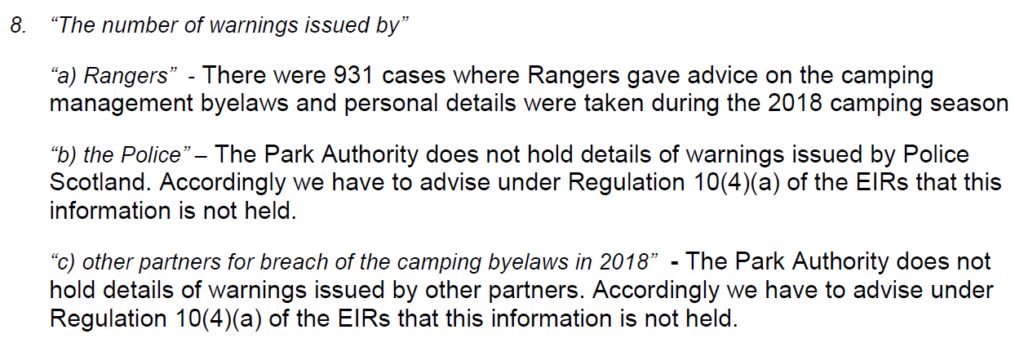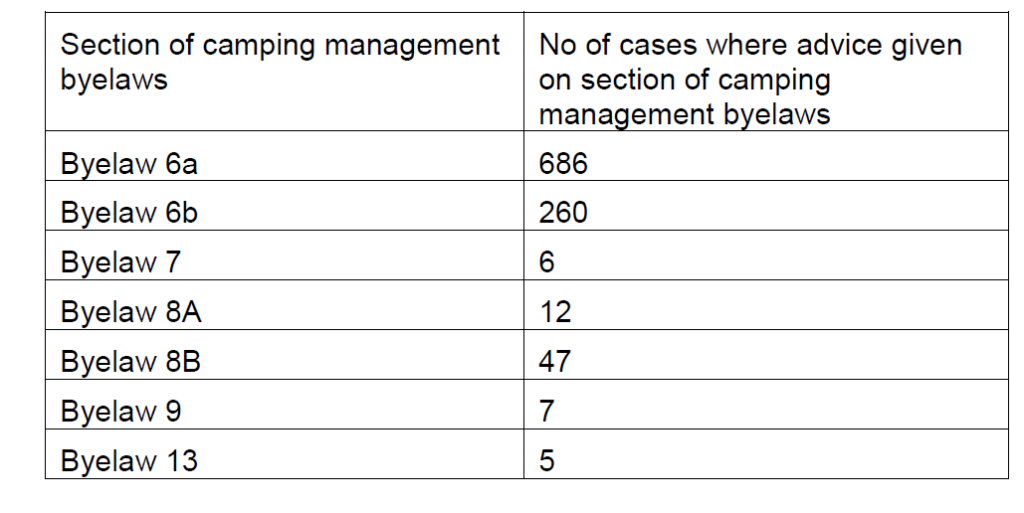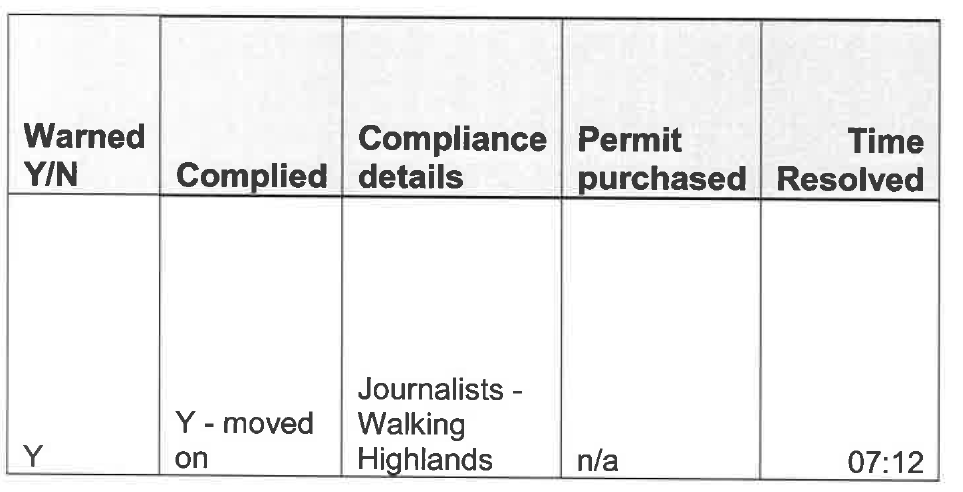In June Parkswatch exposed the unlawful warning system the Loch Lomond and Trossachs National Park Authority had introduced along with the camping byelaws (see here). Staff had no legal authority to introduce such a system, were failing to inform people who were warned of the consequences or their rights, and were retaining personal data about people who had been issued “warnings” for five years. This is two years longer than the Police or Procurator Fiscal are legally allowed to do when they issue warnings. The LLTNPA has now published information which suggests it has re-named its warning system in an attempt to avoid the civil liberties issues. This post takes a look at what has happened and the implications for the camping byelaws.
How has the warning system been changed?
The LLTNPA has not made any public announcement on the changes it has made to its warning system. This is not surprising given it was introduced secretly without approval at a public the Board Meeting. Instead, in response to an Information Request I submitted in October on the operation of the camping byelaws in 2018 (see here), the LLTNPA carefully avoids the use of the term “warnings”:

“Advice” has replaced “warnings” when last year the LLTNPA was happy enough to report to Ministers that it had issued 828 warnings for breach of the byelaws. So, why avoid this term now unless the LLTNPA has been acting unlawfully? Even more strange, the LLTNPA claims not to know how many warnings are issued by its key partners in enforcing the byelaws, the Forestry Commission Scotland and Police Scotland. Is this because they too are now issuing “advice” or do the Police now have a different system to the LLTNPA?
This year’s draft “Update Report” to Scottish Ministers, which will be considered by the Board on Monday 10th December (see here), confirms that the LLTNPA is now issuing “advice” rather than warnings. There is not a single use of the term “warning” in the report. Instead “individual details were taken and advice given”:
5.14 Byelaws and the Environmental Protection Act Enforcement
When required, enforcement of the byelaws was carried out by Rangers or Police Scotland officers. The following figures summarises these actions:
As part of standard practice for byelaw management 931 individuals’ details were taken and advice given in relation to alleged contraventions of Camping Management Byelaws 2017.
No attempt is made to explain to the Board what “advice” means and how it differs from issuing an individual a “warning”. The term “alleged contraventions” is, however, very welcome because it implies the LLTNPA now recognises that people accused of breaching the camping byelaws have legal rights. Under the police system everyone has a legal right to contest a warning and go to Court instead to establish their innocence. Unfortunately the Board Paper fails to say what systems, if any, have been put in place so people can challenge “advice” on “alleged contraventions” of the camping byelaws.
Nor have the Board, Scottish Ministers or the public been told what the LLTNPA plans to do about the 828 cases where it unlawfully recorded that people had been warned last year (often without their knowledge). At the very least, the LLTNPA needs to write to all 828 apologising for this infringement of their legal and human rights and promising to destroy all the personal data it collected.
Apart from the change in terminology, the other serious civil liberties issues remain. How long is the LLTNPA planning to keep the personal data it collects on people to whom its staff offer advice? Is this still five years or now three, like the police and procurator fiscal? What have LLTNPA staff been telling the 921 people whose personal information they collected this year as part of the “advice process” and how do they explain to these people their right to contest this?
All of this, as I understand it, is explained under the Police Warning system. The same rules should apply to the LLTNPA when they collect personal information related to alleged contravention of the byelaws.
How do we know whether the LLTNPA is enforcing the byelaws fairly?
Equality before the law is a basic human right. The Board Paper contains almost no information about the advice/warning system which would enable the Board, the Minister and the wider public to determine whether it is operating fairly and equitably. How many cases have been contested? What use does the LLTNPA then make of the information they hold if someone is suspected of breaching the byelaws again? Does having a “record” make referral to the Procurator Fiscal more likely? If not, why not?
The fundamental questions here are:
- how many people in total contravened the camping byelaws in 2018;
- of these how many were issued warnings/advice and why;
- and of those how many were referred to the Procurator Fiscal and why?
The LLTNPA Board Paper provides numbers for those warned/given advice, 931, and for those referred to the Procurator Fiscal, 12 without answering the “why”. In response to the first question on the total numbers of contraventions of the camping byelaws, the LLTNPA has again this year failed to provide the information even though its “Rangers also captured visitor-related data including visual counts of people, tents, vehicles, fires and estimated litter levels”. We thus don’t know what proportion of people who may be contravening the byelaws are being issued warnings and what determines this.
That the whole system is fundamentally flawed and unfair is demonstrated by this contorted piece of park speak from the Board Report:
An occupancy level of 103% was reached in July in the East Loch Lomond Camping Management Zone. This is attributed to the limited number of permits that can be sold in a Camping Management Zone, with East Loch Lomond only containing one permit area, (although considerable camping
provision is available at the other more formal campsites in the area). Wherever possible Rangers will assist campers to comply with the byelaws. In some cases such as West Highland Way walkers who find themselves fatigued and too far from a formal campsite, Rangers will give some discretion
in the application of the byelaws, which in a limited number of cases may lead to temporary over-occupancy in permit areas.
Problem “attributed”……….”assist campers to comply”……………….”some discretion in the application”.
This problem, that of discretionary application of the byelaws, is accentuated by a number of clauses where the meaning of the byelaws is unclear. For example, Byelaw 8 creates two offences. The first is for lighting a fire that “causes or is likely to cause damage” (8A) while the second is for collecting wood that “causes or is likely to cause damage” (8B). “Damage” and “likely to cause damage” are not defined under the byelaws – an attempt was made originally but dropped on legal advice because it was too difficult – and the LLTNPA has never publicly issued advice about what it believe damge means. Anyone who was out and about in the National Park will have realised dozens of people continue to light fires. While the LLTNPA is trying to keep the total number recorded secret (this is subject to an appeal to the Information Commissioner), EIR 2018-031 Response show that when advice is issued to people for alleged contravention of the byelaws it is recorded like a warnng. In 2018 12 people were given “advice” for lighting fires and 47 for collecting wood:

Was that advice clear enough for people to understand why they were being asked for their names and addresses for lighting fires and collecting wood, when others around weren’t asked, and to contest it if they disagreed?
Byelaw 7, which had been intended to prevent campervans and caravans stopping off overnight in camping management zones, provides another example where there are no clear rules. Last year a handful of warnings were issued to campervanners before it became clear that the exemption which allowed people to stay overnight on a road over which there is a right of passage, whether private or public, made this byelaw practically unenforceable. Last year the LLTNPA stated that it had NO records of what constituted a road under the terms of the camping byelaws and offered no advice to its Rangers on this (see here). Its surprising therefore to find that the LLTNPA declares there were 6 cases in 2018 where people have been provided advice under Bye Law 7 and at least one case referred to the Procurator Fiscal. How did the Rangers determine whether these people were on a road or not and, if they now know, why haven’t the public been told? If Byelaw 7 is still being applied to some campervans, is the LLTNPA now also applying it to caravans? There are many parked off road in the National Park and they constitute a vehicle under the terms of the byelaws. The fair application of the byelaws demands that the LLTNPA explains this, yet the Update Report to Ministers is silent.
Its time a campervanning organisation challenged this in Court.
LLTNPA governance and the camping byelaw warning system
The LLTNPA Board has allowed staff to assume far too much power. They are allowed to introduce systems and procedures, which in the case of the byelaws fundamentally impacts on civil liberties, without any scrutiny by the Board. This is then all made to look respectable by Internal Audits into how the Park operates.
In March 2018, the LLTNPA’s Audit Committee considered and approved an internal audit report (see here) into the operation of the camping byelaws.
” 2.2.3 The detailed work undertaken as part of the Camping Management Byelaws audit included:
- Review of the first Annual Update Report submitted to the Scottish Ministers;
- Review of the Camping Management Byelaws 2017, the Visitor Management Engagement and Enforcement Policy, the Scheme of Delegation, Camping Byelaws authorisation and enforcement flowchart;
- Review of the process of enforcing byelaws, understanding what triggers byelaws, non-compliance and the systems and procedures for reporting to the Procurator Fiscal;”
A comprehensive remit. The Audit findings in effect gave the LLTNPA a clean bill of health in respect of the camping byelaws, including enforcement:
- There is a number of policy and procedures documents in place indicating effective governance;
If that governance has been so “effective” how is it that a few months later the LLTNPA has abandoned its use of the term “warning”? The most basic function of internal audit is to ensure that an organisation complies with the law. The Audit into the camping byelaws failed to consider the legal basis of the LLTNPA’s attempts to enforce the byelaws, from campervans (see here) to the warning system. This is not the fault of the staff involved from West Dunbartonshire Council, who almost certainly did not have the time or expertise to consider this properly.
What has been lacking from the start in respect of the byelaws is any effective system of external scrutiny.
The ongoing collapse of the camping byelaws
The LLTNPA is still involved in an extensive cover up of what is actually happening with the camping byelaws. It is continuing to withhold basic information which would enable them to be judged. What few details we have about the Park’s warning system, for example, have only become public because the campaigning journalist David Lintern asked the Park what information they held on him:

It was not made clear (despite repeated questions afterwards) to David that the Park intended to hold this information and personal data about him for five years. Perhaps all that has now been changed is that LLTNPA senior staff have replaced the word “Warned” in its spreadsheets with “Advice”. If that is so, the fundamental civil liberties issues remain. I will now take this formally up with the the Scottish Government and the Scottish Human Rights Commission while continuing with appeals to the Information Commissioner about the information the LLTNPA is keep secret. I am confident that every further piece of information which is extracted will bring the end of the byelaws closer.
Meantime, its clear the attempt to remove camping from access rights and replace this with a permit system is not working. Despite all the extra no camping signs, more people received “warnings” this year than last, 931 compared to 828. Of those 931 12 were referred to the PF (and three of these involved serious fly tipping offences too). From the tents I saw, I suspect well over 2000 camped in camping management zones this year without a permit. That means people camping despite the byelaws have about a 0.5% chance of being referred to the Procurator Fiscal. Camp according to the Scottish Outdoor Access Code and its very unlikely the Park will take any action unless your face doesn’t fit, as happened to an angler last year (see here).
Within this context, the Park’s replacement of “warnings” by “advice” provides additional assurance to responsible campers that they are extremely unlikely to be prosecuted for ignoring the camping byelaws. If you have been warned by the police and commit another offence the courts will take that warning into account. Advice does not have the same legal status. The message is respect the Scottish Outdoor Access Code and you can Carry on Camping.
How many more resources is the National Park going to waste on enforcement instead of putting the intrastructure in place that would help people who are committed to camping responsibly. It will be interesting to see what the new Board makes next week of the disaster the LLTNPA has created for itself.